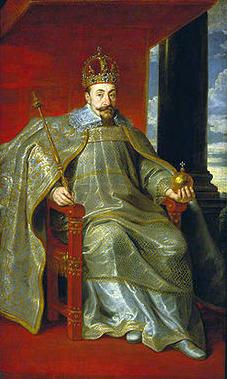It happened today - February 19, 2016
 Please don’t think I’m obsessed with Lithuania. Not that there’s anything wrong with it either. But I’m still thinking about these alternative histories of Eastern Europe, generally happier than the chaos that drew in predatory neighbours from the Ottomans to the Czars to the Prussians and on into the 20th century. And so I’m struck by the fact that on February 19, in 1594, Sigismund III was crowned king of Sweden.
Please don’t think I’m obsessed with Lithuania. Not that there’s anything wrong with it either. But I’m still thinking about these alternative histories of Eastern Europe, generally happier than the chaos that drew in predatory neighbours from the Ottomans to the Czars to the Prussians and on into the 20th century. And so I’m struck by the fact that on February 19, in 1594, Sigismund III was crowned king of Sweden.
“Sweden?” you cry. “How did Sweden get in here? Don’t you know one shore of the Baltic from another?” Well, yes. But the fact is that Sigismund had already been head of the Polish-Lithuanian Commonwealth since 1587, on his mother’s side, and would remain so until he died in 1632. Becoming king of Sweden as well, on his father’s side might have made the Baltic a Swedish-Lithuanian-Polish lake (or whatever you’d call the thing, Swithlandish or something), extending the generally benign political culture of Scandinavia into Eastern Europe. And Sweden was in those days a power to be reckoned with, not the pious pacifists of modern times, to the point that the Danish national anthem celebrates fighting them off over 200 years including the memorable line “Through Gothic helm and brain it passed”, it being Danish King Christian VII’s sword.
Alas, this even greater Lithuania was not to be. Poor Sigismund got the Swedish boot from his own uncle, Charles IX, just five years later, and spent decades trying in vain to get the crown back. Apparently he was a pretty good king and a fairly enlightened man, though unsurprisingly there is much historical and popular controversy about him. But the key thing is that he was a king in Eastern Europe and there was just too much trouble to cope with.
It didn’t help that Poland really did have a system where votes in Parliament had to be unanimous, which Sisigmund managed to overcome. But in addition to endless wars to regain the Swedish crown, he found himself fighting the Grand Duchy of Muscovy (he even captured Moscow, which is impressive but as Napoleon found not always useful), the Turks, and his own nobles, and toward the end he got rather fed up and withdrew into family matters and the performing arts.
It’s hard to blame him. It’s easy to blame him for his Swedish wars, which helped sap Lithuania’s strength. But on the other hand, if he’d won, we might be regarding him as one of the great constructive figures in European history. Even if one of his maneuvers did involve the Hohenzollerns inheriting the then Duchy of Prussia, with unfortunate consequences down the road that no one could have foreseen.
One can always pick nits, and he had his flaws. But as I said in an earlier post (Feb. 17), it’s just not a good idea to be in Eastern Europe. The neighbourhood is too chaotic to settle down, which is why there’s still a France but no Swithland despite the best efforts of old Sisigmund III.